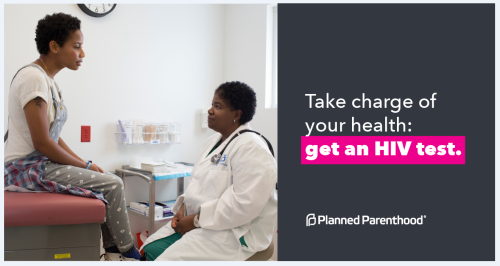Today is National Black HIV/AIDS Awareness Day — a Call for Equitable HIV Prevention

February 7th is National Black HIV/AIDS Awareness Day — an observance created in 1999 to raise awareness about HIV prevention, education, testing, and treatment for Black communities.
According to the Centers for Disease Control and Prevention (CDC), Black Americans make up 13% of the US population, but 42% of new HIV diagnoses. It’s clear that there’s a real disparity in health care access and HIV prevention methods for Black communities. Fortunately, providers, educators, advocates, and organizations like Planned Parenthood have identified the tools to address this public health crisis.
HIV PREVENTION & EDUCATION
Education is key to prevention. Black gay and bisexual men and Black men who have sexual contact with other men account for the highest rate of new HIV diagnoses.The CDC estimated 44% of Black transgender women live with HIV, and 26% of Black people who received an HIV diagnosis in 2017 were cisgender women. Structural racism and implicit biases in the medical field impact Black people’s access to quality health care and creates barriers around getting information and support. These inequities often result in delayed diagnoses and higher rates of HIV, while stigma and miseducation can leave Black communities without preventative tools and lifesaving treatments. All of these barriers ultimately restrict Black people living with HIV from getting the care and support they deserve.
HOW TO GET TESTED
1 in 7 Black Americans are living with HIV and are unaware of it. Most people who have HIV don’t show any symptoms right away. That’s why regular testing is important — it can lead to early diagnosis and treatment. Planned Parenthood health centers offer compassionate care, including HIV testing and counseling. The staff at Planned Parenthood are nonjudgmental and can answer your sexual health (even the ones you may be afraid to ask). Learn more about making an appointment.
If you’re not able to reach a health center, you can test yourself for HIV using an at-home HIV testing kit. With the OraQuick In-Home HIV Test, you swab your gums and test the sample yourself. You get results in 20 minutes. With the Home Access HIV-1 Test, you prick your finger to get a small amount of blood. You mail your blood sample to a lab, and get your results in about a week.
At-home tests are totally anonymous — you’re the only person who will know the results. And both types of tests help connect you with counselors who can give you support and advice about treatment if you test positive. Knowing your HIV status is essential to staying healthy and taking control of your sex life.
TREATMENT
All STDs, including HIV, are treatable. However, you can’t get treatment if you don’t know your status. If you think you may have been exposed to HIV, make an appointment with your nurse or doctor or at a Planned Parenthood health center to find out if post-exposure prophylaxis (PEP) is right for you. PEP is a series of pills that you start using within 72 hours of being exposed to HIV. There is also pre-exposure prophylaxis (PrEP) — PrEP is a daily pill that can help prevent HIV. Taking PrEP every day can lower your chances of getting HIV from sex by more than 90%. Both PrEP and PEP can help people live healthy and safe sexual lives.
WHAT HIV PREVENTION WORK IS PLANNED PARENTHOOD DOING FOR BLACK COMMUNITIES?
Some Planned Parenthood health centers provide PrEP and PEP, and all health centers can connect people living with HIV to treatment options so they can get the care they need.
In 2017, we launched our HIV Prevention Initiative in partnership with the Black AIDS Institute (BAI), a national organization working to stop the HIV epidemic in Black communities by engaging and mobilizing Black institutions and individuals. This initiative allowed us to expand our comprehensive HIV prevention and education efforts for communities that face the most barriers to accessing equitable health care, education, and treatment.
To find a health center near you and learn more about HIV prevention, go to plannedparenthood.org.
-Jocelyn and Leanna at Planned Parenthood